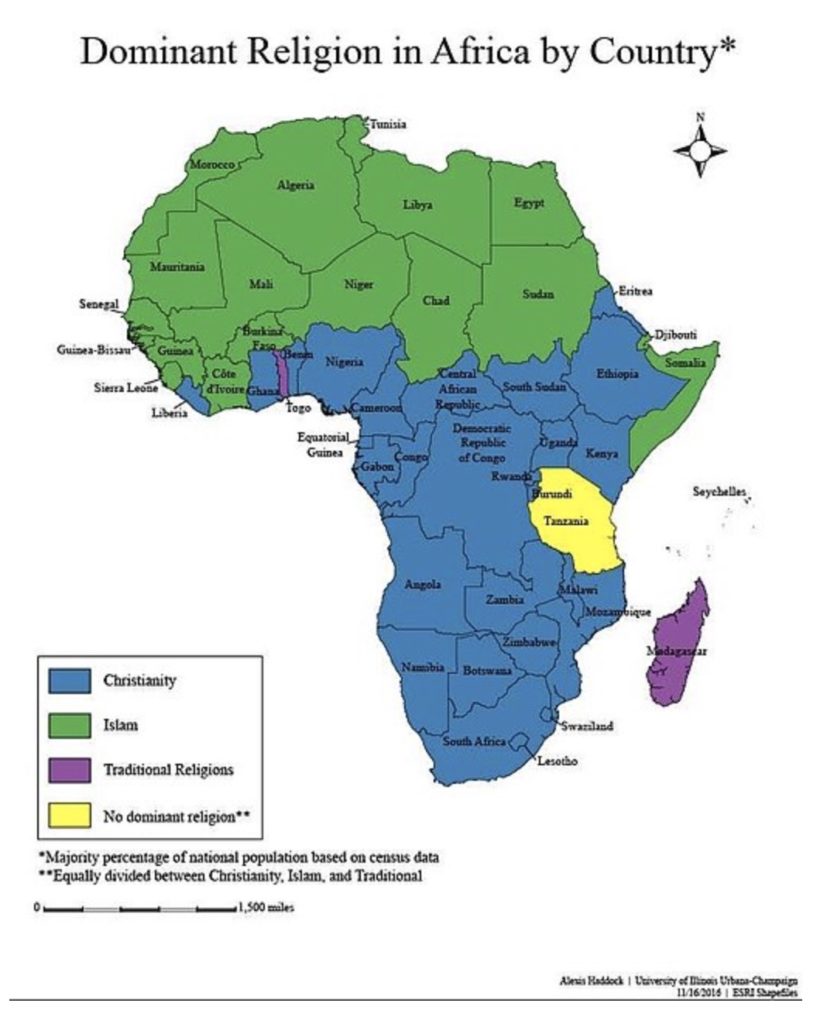
In Africa, as elsewhere in the world, religious beliefs have an influence on the number of children a woman will bear. There are many factors that go into family size choices, and religion is one that is rarely explored.
In the USA, Utah is an example of how religion influences family size. It has had the highest fertility rate, probably in part because of its large number of Mormons (Latter Day Saints). This religion has traditionally encouraged large families, and many Utahans have complied. I know an example from my practice. An LDS patient from Utah requested reversal of her tubal ligation, which was done after her 5th child was born. She regretted the sterilization and wanted more children. I succeeded in putting her tubes back together, and she ended up with 12 kids!
In many African countries—especially south of the Sahara—the predominant religions encourage high fertility. Many groups of both Christians and Muslims believe that children are gifts from God and feel that contraceptive use is prohibited. Part of the motivation for large families seems to be that there is strength in numbers—especially if a group feels threatened. In addition, agrarian people tend to look upon children as a resource for work, while urban societies may consider kids financial burdens. Furthermore, rural people have less access to contraception than those who live in cities. A third major group of religious believers, those who follow traditional faiths, tend to have many children, perhaps because they are more likely to be subsistence farmers.
What can be done to help women get effective birth control? IUDs and implants, the most effective temporary contraceptive methods, are expensive and require skilled providers. Fortunately, a promising new variation of an old method has won favor in several African countries. For over 50 years women have trusted DMPA (DepoProvera®) for contraception. It is very effective, but requires a shot every 3 months—which is especially difficult for rural women. Some women have sickle cell anemia, an inherited disease in Black Africans, which causes painful crises. DMPA can actually prevent these crises in addition to preventing pregnancy!
Sayana Press® is the same medication in a more convenient form. In a trial, Ugandan women who chose Sayana Press® were taught how to give themselves the first shot in a clinic. They went home with 3 more shots to self-administer at 90-day intervals. This meant only one clinic visit a year—much better for someone who might need to walk miles or take an expensive bus to the nearest family planning clinic.
Education is an important way to empower women and for them to gain control of their fertility. Perhaps this teaching could include mention of the advantages of smaller families. In Sub-Saharan Africa, as in other parts of the world, the more years of school a girl or woman attends, the smaller her family is likely to be. Joyce Asimit Simiyu of northwest Kenya is a good example. She is the oldest of seven kids. Although elementary school was free, her family didn’t have resources for her to go to secondary school. The Quaker Girlchild Education Fund provided scholarship aid for high school and eventually she finished college. She and her husband are the parents of only two.
There are innovative ways that family planning services are delivered in Africa. Catholic dogma is against modern contraceptive methods, but people have found ways around that doctrine. I asked a Catholic nun who runs a health center in Tanzania if they provided contraception. “No,” she said, “we leave that to the Protestants down the road.” Rwanda is another example, where much of the health care is provided by the Catholic Church. After the 1994 genocide, the government recognized the importance of family planning and placed a family planning clinic close to each of the Catholic facilities.
Many places in Africa already exceed the land’s ability to feed its people, yet the world’s fastest growing populations are there. What works to slow growth? In many cultures religious leaders are key to promoting successful family planning. Although they may not be interested in slowing the growth of their congregation, most leaders will want to improve the health of their mothers and children. One of the best ways of doing that is with contraception to lengthen the interval between pregnancies.
© Richard Grossman MD, 2022